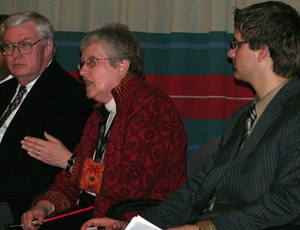 |
Myrna Newland, M.D., director of the UNMC Equity Office, center, makes a point during a Thursday lunch and learn session about a potential ban on affirmative action as faculty senate president Gordon Todd, Ph.D., left, and student senate president Curtis McKnight look on. |
Noting the diversity found at Harvard, Columbia and, yes, UNMC, Dr. Pamies and other medical center leaders emphasized the importance of affirmative action in helping UNMC maintain a diverse workforce and student body.
The panel discussion was held to spotlight possible ramifications of a legislative resolution that would ban affirmative action at state institutions.
“I see affirmative action at work when I look out and see what I see now,” Dr. Pamies said as he gazed out over the crowd of about 70 people in the Eppley Science Hall Amphitheater.
The crowd — which included a large number of women and people from a wide array of racial and ethnic backgrounds — reflected the diversity he was stressing, Dr. Pamies said.
Dr. Pamies was joined on the panel by Myrna Newland, M.D., director of the UNMC Equity Office; Gordon Todd, Ph.D., president of the UNMC Faculty Senate; and Curtis McKnight, president of the UNMC Student Senate.
Vice Chancellor for External Affairs Bob Bartee, who served as a moderator for the discussion, said the resolution — LR 233CA — could have implications that extend well beyond hiring and student enrollment.
If LR 233CA is approved, Nebraska risks being viewed as unwelcome to people of diverse backgrounds, which could cause companies to go elsewhere to do business and cost the state jobs and economic opportunities, Bartee said.
Dr. Pamies and McKnight said affirmative action is not about filling quotas or allowing under qualified individuals to fill positions but rather ensures that qualified people from underrepresented groups get opportunities they deserve.
“The system isn’t about lowering standards,” McKnight said. “It’s about eradicating barriers.”
Dr. Newland attended UNMC in 1964 and was one of just five female students in the College of Medicine. The crowd on Thursday was concrete proof of the progress that affirmative action has allowed.
And while affirmative action has fostered more diversity in the nation’s workforce and academic realm, there is still much progress to be made, Dr. Newland said, especially in terms of providing opportunities to racial minorities.
She illustrated her point by noting that only 80 black women and only 300 black men hold full professor titles at U.S. medical schools.
LR 233CA stands to halt and even undo some of that progress, Dr. Newland said.
“This initiative could turn back the clock on the small but significant gains that have been made because of affirmative action,” Dr. Newland said.
Communities in Nebraska and across the United States are becoming more diverse and it’s important that UNMC be able to provide its students an accurate sense of what they will experience in their careers, Dr. Todd said.
|
UNMC is able to provide the experience that Dr. Todd alludes to because of affirmative action, McKnight said.
“The system is working,” he said. “We don’t need (anyone) to come in and tell us how to fix it.”
McKnight and Bartee both noted that the wording of LR 233CA is deceptive.
“They actually take the words of Martin Luther King Jr. and others from the civil-rights era and use them to support this measure,” Bartee said.
LR 233CA, reads “The state shall not discriminate against, or grant preferential treatment to, any individual or group on the basis of race, sex, color, ethnicity, or national origin in the operation of public employment, public education, or public contracting.”
If passed in the Legislature, the bill will be placed on the ballot in November for voter approval.
For more information about LR 233CA, please visit www.unmc.edu/diversity. Visit http://www.unmc.edu/LC233CA/speakers.htm to learn about and/or join a speakers bureau that advocates against the passage of LR 233CA.